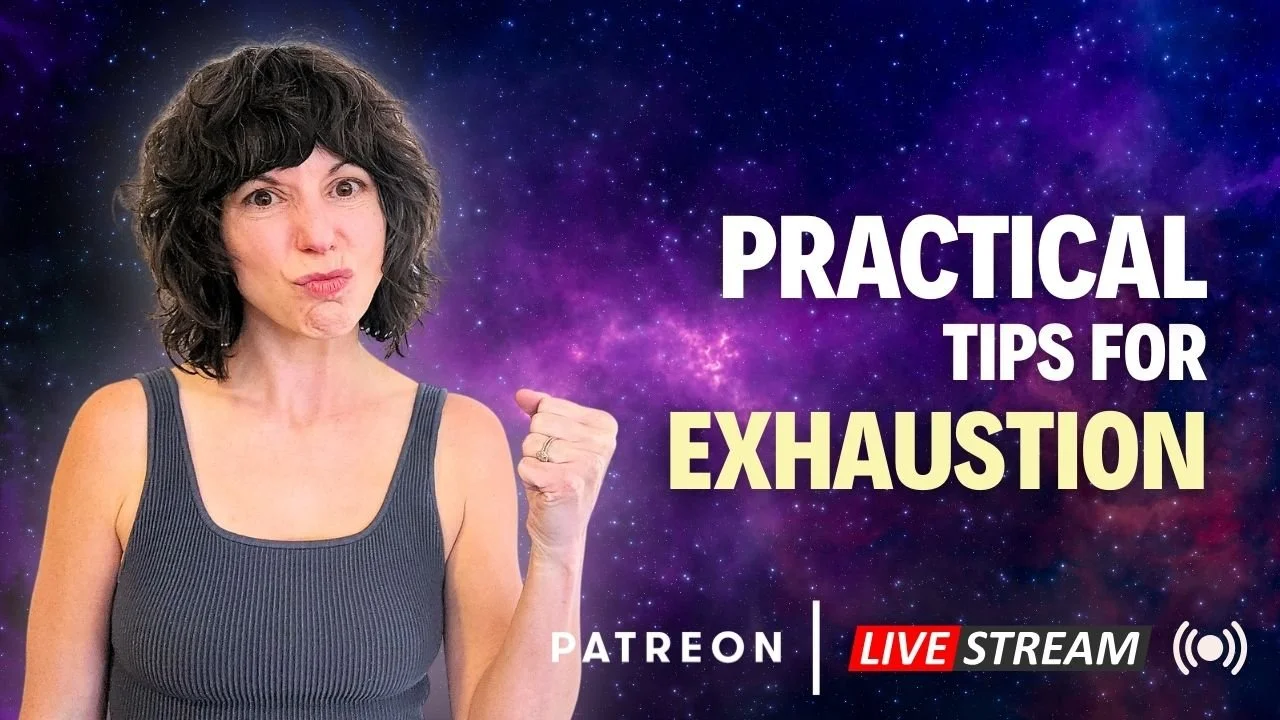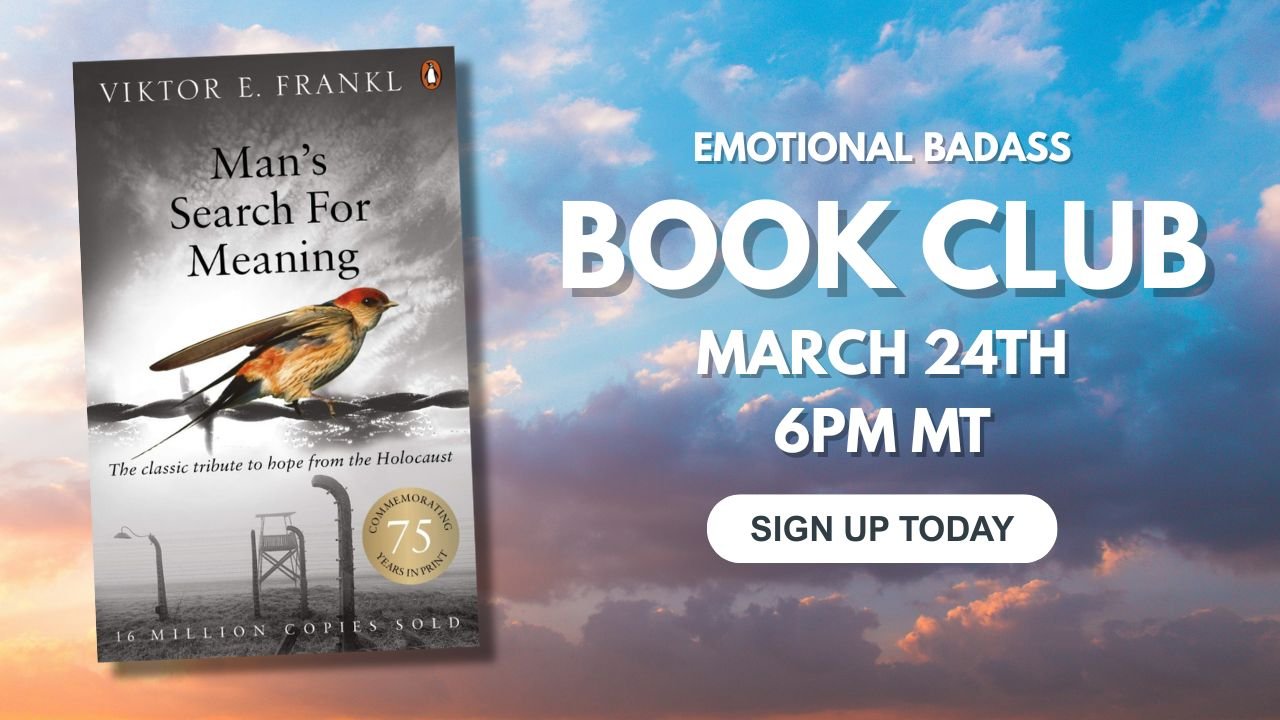Empathy Has a Price: Balancing Compassion with Self-Protection
When Your Biggest Strength Becomes Your Greatest Weakness
As an empath or highly sensitive person, you possess a remarkable gift—the ability to see potential, beauty, and goodness in others that many people miss. You naturally hold space for growth and transformation. You believe in second chances and can intuitively sense the wounded inner child beneath someone's difficult behavior.
But what happens when this superpower becomes your kryptonite?
In a recent conversation with Roma, a psychiatric social worker and coach with the same empathic tendencies many of us share, we explored what she brilliantly termed her "red flag eraser"—that protective part of herself that allows people to fill roles she needs or longs for, even when they're not the right fit.
The Origins of the Red Flag Eraser
Like many empaths, Roma's tendency to overlook warning signs in relationships stems from early trauma. She lost her father at age four and watched her mother develop alcoholism, forcing her to become parentified—essentially becoming her own parent while also emotionally parenting her mother.
"This protective self helped me keep relationships intact and put a positive spin on my pain because I needed to survive," Roma explained.
Sound familiar? When we experience abandonment, loss, or emotionally unstable caregiving in childhood, we often develop sophisticated coping mechanisms designed to preserve any connection available to us—because connection, even painful connection, feels safer than abandonment.
The brain adapts by creating what Roma calls a "red flag eraser"—a part of ourselves that minimizes, justifies, or completely overlooks concerning behaviors in others to maintain relationships we perceive as necessary for survival.
When Professional Skills Amplify Personal Patterns
What makes this dynamic particularly challenging for those in helping professions is that the very qualities that make you excellent at your work—empathy, seeing potential, holding space for growth—can exacerbate your tendency to erase red flags in personal relationships.
Roma described how her top three natural talents—positivity, empathy, and being a developer (someone who sees potential in others)—serve her beautifully in her professional life but can become problematic in personal relationships:
"This protective self is sometimes a superpower and sometimes a kryptonite. How do I keep it when it's helpful and how do I work against my natural talents when actually it's hurtful and I need to be more self-loyal?"
This question resonates deeply with many helpers and healers. We're trained to hold space, to see the good, to believe in growth—but we're rarely taught how to balance these skills with healthy self-protection.
The Depth Discrepancy
One of the most painful realizations for empathic, emotionally intelligent people is the recognition that not everyone operates at the same emotional depth or with the same commitment to growth and self-awareness.
Roma shared an example of a coworker with whom she vibes well intellectually but who has emotional outbursts that are hurtful:
"What I want to do is just keep saying, 'I appreciate you and you are so valuable to the team and let's work together through this.' But at some point, I'm just allowing those behaviors to continue because she continues to have them."
This highlights a crucial distinction: There's a difference between recognizing someone's potential and signing up to be their emotional punching bag while they figure themselves out.
The Missing Piece in Mental Health Training
As mental health professionals or empathic helpers, we often blame ourselves for these relationship struggles. But there's a systemic issue at play that rarely gets discussed: our professional training programs focus extensively on caring for others while offering minimal guidance on caring for ourselves.
"I think if our professional training programs had more integrity and more care for us as they teach us how to care for other people... we would hear things before we were ever working with the population like, 'Hey, the more that you grow in this field and self-develop, the more it makes you different than people that are out there in the general population.'"
Being an awakened person who spends hours honing the skill of holding space for others creates a profound imbalance in our personal relationships. We can hold massive space for all kinds of people, but when we need someone to hold space for us—or simply to acknowledge when they've hurt us and apologize—we often feel deeply disappointed.
Permission to Practice Discernment
If you identify with Roma's struggle, here's the permission slip you might need: Discernment is not mean. It's not closed-hearted. It's not cynical. It's natural, healthy, and necessary.
Think of it this way: No animal in nature meets another animal on the path with naive openness. Every creature assesses and discerns: Are you safe for me? This isn't cruelty—it's wisdom.
As empaths who may have been trained by trauma to abandon discernment for the sake of connection, we often need to actively reclaim this natural protective instinct.
The AND Solution: Keeping Your Heart Open While Protecting It
The solution isn't to shut down your beautiful capacity to see the good in others. It's to add something to it—to make it an "and" rather than an "or."
You can maintain your ability to see potential AND practice rigorous discernment about who gets access to your deepest self.
You can appreciate someone's good qualities AND acknowledge that they may not be capable of the emotional maturity or reciprocity you need in close relationships.
You can hold space professionally for clients AND recognize that in your personal life, you deserve relationships with people who can meet you halfway.
Practical Steps Toward Healthy Discernment
Rename your protector part. If you identify with having a "red flag eraser," recognize that this part isn't actually protecting you—it's protecting you from the potential loss of relationships that end up hurting you anyway. Consider what healthier function this energy could serve.
Practice speaking up in the moment. While therapeutic training teaches us to hold back and create space for others, personal relationships require more immediate feedback. Try saying: "I notice you just lashed out at me. That's becoming a pattern, and it's not okay with me."
Watch for embodied signals. Notice how your body feels when you're with different people. A tight chest or feeling "glued to the chair" might be signals that your nervous system is detecting something your red flag eraser wants to ignore.
Accept potential temporary loneliness. The reality is that awakened, emotionally mature people are relatively rare. Being selective about who you allow into your inner circle may mean periods of solitude while you wait for healthier connections to form.
Reframe guilt around boundary-setting. If you feel guilty about discernment, recognize this as a trauma response. You are not responsible for providing unlimited space for others to grow at your expense.
The Loneliness of Awakening
There's a bittersweet truth that many empaths eventually face: the more you awaken, the more you may notice the gap between your level of emotional awareness and that of many others around you.
This realization can feel profoundly lonely. But there's freedom in acknowledging it rather than continuing to bang your head against the wall of disappointment when people can't meet you where you are.
As I shared with Roma: "It's one thing to be lonely when we are singular. It's infinitely lonelier when we are together with someone feeling lonely."
A Final Thought for the Helpers and Healers
If you've developed a powerful capacity for empathy, space-holding, and seeing the good in others, please don't shut that light off. The world needs your warmth, your compassion, and your belief in human potential.
But also remember that you deserve protection, reciprocity, and relationships where you're not always the one doing the heavy emotional lifting. Your discernment isn't a betrayal of your empathic gifts—it's the wisdom that allows those gifts to shine sustainably rather than burn you out.
As Roma beautifully realized during our conversation, healthy boundaries create space for new, more reciprocal relationships to enter your life. There's trust in knowing that when you stop pouring energy into connections that drain you, you create capacity for relationships that nourish you.
And that, dear empath, is not just good for you—it's good for everyone whose life you touch.
Episode Tags
- ADD 1
- Abuse 17
- Alcohol 3
- Anger 11
- Archetypes 1
- Bullying 6
- Childhood 37
- Codependency 10
- Covid 4
- Crystal Catalina 4
- Depression 15
- Detachment 2
- Disassociation 4
- Emotions 75
- Existentialism 2
- Faith 1
- Family 28
- Fatigue 4
- Focus 3
- Gratitude 11
- Grief 14
- Guilt 2
- Healers 7
- Healing 52
- High Sensation 4
- Hope 1
- Hypervigilance 7
- Introverts 6
- Lonliness 9
- Love 3
- Manifesting 5
- Manipulation 20
- Masculinity 1
- Men 1
- Mindfulness 39
- Money 10
- Music 3
- Nutrition 2
- Overthinking 8
- PTSD 13
- Parenting 12
- People Pleasing 9
- Perfectionism 6
- Pets 4
- Relationships 21
- Resiliency 14
- Sadness 1
- Self Esteem 19
- Self Love 11
- Self Respect 1
Upcoming Events
Episode Tags
- ADD 1
- Abuse 17
- Alcohol 3
- Anger 11
- Archetypes 1
- Bullying 6
- Childhood 37
- Codependency 10
- Covid 4
- Crystal Catalina 4
- Depression 15
- Detachment 2
- Disassociation 4
- Emotions 75
- Existentialism 2
- Faith 1
- Family 28
- Fatigue 4
- Focus 3
- Gratitude 11
- Grief 14
- Guilt 2
- Healers 7
- Healing 52
- High Sensation 4
- Hope 1
- Hypervigilance 7
- Introverts 6
- Lonliness 9
- Love 3
- Manifesting 5
- Manipulation 20
- Masculinity 1
- Men 1
- Mindfulness 39
- Money 10
- Music 3
- Nutrition 2
- Overthinking 8
- PTSD 13
- Parenting 12
- People Pleasing 9
- Perfectionism 6
- Pets 4
- Relationships 21
- Resiliency 14
- Sadness 1
- Self Esteem 19
- Self Love 11
- Self Respect 1




















